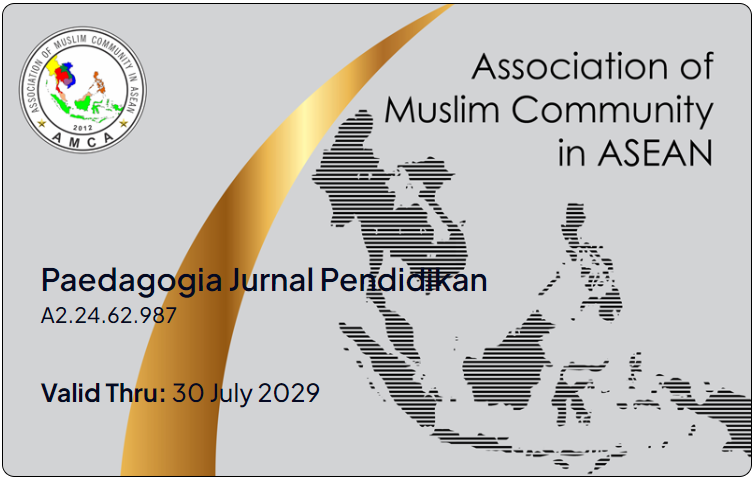ACADEMIC MOTIVATION LEVEL AND ATTITUDE TOWARDS SOCIAL STUDIES AMONG PUBLIC SCHOOL SECONDARY STUDENTS IN ZAMBOANGA SIBUGAY PHILIPPINES
Abstract
In a Social Studies, students' academic motivation and attitudes will be useful to their academic progress. If a student is enthusiastic about a subject, he or she will do better in class and learn faster. There have been a lot of studies that have looked into students' academic motivation and attitudes toward social studies, but there does not appear to be any study that focuses on the learners themselves. This quantitative study aims to determine the level of academic motivation as well as the attitude toward social studies of 458 secondary students from public schools using the Academic Motivation Scale High School Version and Secondary Students Attitudes Towards Social Studies Scale. It also looked at whether there was a significant difference in academic motivation and attitude toward social studies when respondents were sorted by gender. Finally, it investigates the link between academic motivation and attitude towards social studies. Students are found to be "highly motivated" in terms of academic motivation and have a “positive attitude” toward social studies, according to the findings. Furthermore, when respondents were divided into gender groups, no significant differences in academic motivation and attitude toward social studies were found. Finally, academic motivation and attitude toward social studies show a significant favorable relationship.
Downloads
References
Akman, H. (2011). The diversification of gender and organizational statute in internal and external motivations: The research on the engineers and the technicians in Türk Telekomünikasyon A.Ş. Non-thesis master project, Süleyman Demirel University, Isparta.
Akpınar, M. (2006). The effects of students? Attitudes towards physics courses on students? Academical accomplishment in physics courses. Unpublished master’s thesis, Gazi University, Ankara.
Alajaji, A. (1999). A survey of male teachers, supervisors, schools administrators’ attitudes towards global education in Social Studies in secondary public schools in Riyadh, Saudi Arabia. Unpublished doctoral dissertation, Ohio State University, Ohio.
Al-Aklobi. (1992). Survey of the attitudes of Social Studies teachers and supervisors toward Social Studies education in boy’s secondary schools of the Saudi eastern province. Doctoral dissertation, University of Mississippi, Mississippi.
Alazzi, K., & Choido, J. (2004). Students’ perception of Social Studies: A study of middle school and high school students in Jordan. International Journal of Scholarly Academic Intellectual Diversity, 8(1), 3-10.
Altun, F., & Yazıcı, H. (2010). Öğrencilerin okul motivasyonunu yordayan bazı değişkenler. An oral presentation of International Conference on New Trends in Education and Their Implications, Antalya.
Arslan, A. (2006). The attitude scale toward making computer-supported education. Yüzüncü Yıl Üniversity Journal of Education, 11(II), 24-30.
Blankenship, G. (1990). Classroom climate, global knowledge, global attitudes, political attitudes. Theory and Research in Social Education, 18(4), 363-370.
Broussard, S. C., & Garrison, M. E. B. (2004). The relationship between classroom motivation and academic achievement in elementary school-aged children. Family and Consumer Sciences Research Journal, 33(2), 106-115.
Çalışkan, H., & Kılınç, G. (2012). The Relationship Between the Learning Styles of Students and Their Attitudes Towards Social Studies Course. Procedia - Social and Behavioral Sciences, 55, 48-49. doi:10.1016/j.sbspro.2012.09.476
Çetingöz, D., & Özkal, N. (2009). Learning strategies used by unsuccessful students according to their attitudes towards social studies courses. Procedia Social and Behavioral Sciences, 1, 1905-1906. doi:10.1016/j.sbspro.2009.01.335
Coşkun, K. (2019). Temel eğitimde sosyal bilgiler öğretimi sosyal bilgiler dersinde duyuşsal öğrenmelerin yeri ve önemi. In C. Kara (Ed.), Sosyal bilgilerin temelleri içinde (pp. 35-40). Ankara: Pegem Akademi Yayıncılık.
Deci, E. L., & Ryan, R. M. (1985). Intrinsic motivation and self-determination in human behavior. New York: NY: Plenum Press.
Deci, E. L., & Ryan, R. M. (2002). An overview of self-determination theory: Organismic-dialectical perspective. In D. &. Ryan, Handbook of self-determination research (pp. 3-20). Rochester: NY: The University of Rochester Press.
Deci, E. L., Vallerand, R. J., Pelletier, L. G., & Ryan, R. M. (1991). Motivation and education: The self-determination perspective. Educational Psychologist, 26(3-4), 325-346.
Delgado, P. (2019, October 22). The Importance of Parental Involvement in Teaching. Retrieved from Institute for the Future of Education: https://observatory.tec.mx/edu-news/the-importance-of-parental-involvement-in-teaching#:~:text=The%20students%20feel%20more%20motivated,benefit%20extends%20to%20all%20ages.
DePaulo, P. (2000). Sample size for qualitative research. Quirks Marketing Research Review, 1202.
Dundar, S. & Rapoport, A. (2014). Elementary Students’ Attitudes toward Social Studies, Math, and Science: An Analysis with the Emphasis on Social Studies. The Councilor: A Journal of the Social Studies, 75(2), 1-11.
Eccles, J. S., & Wigfield, A. (2002). Motivational beliefs, values, and goals. Annual review of psychology, 53(1), 109-111. doi:100901.135153
Ergin, A. (2006). İlköğretim öğrencilerinin sosyal bilgiler dersine ilişkin tutumlari. Unpublished master’s thesis, Pamukkale Üniversitesi Sosyal Bilimler Enstitüsü Denizli.
Faiz, M. & Karasu Avcı, E. (2020). Academic Motivation Levels of Secondary School Students and Their Attitudes towards a Social Studies Course. Review of International Geographical Education, 10(2), 157-160. doi:10.33403/rigeo.693769
Fidan, M., & Altay, E. (2017). Relationships between the profiles of middle school students’ attitudes towards Turkish course and motivations for education. Hacettepe University Journal of Education, 32(2), 480-485. doi:10.16986/HUJE.2017024892
Gömleksiz, M. N., & Serhatlıoğlu, B. (2013). Prospective teachers’ perceptions of academic motivation levels. The Journal of Turkish Social Research, 17(3), 103.
Gottfried, A. E. (1990). Academic intrinsic motivation in young elementary school children. Journal of Educational Psychology, 82(3), 525-535.
Gottfried, A. E., Fleming, J. S., & Gottfried, A. W. (2001). Continuity of academic intrinsic motivation from childhood through late adolescence: A longitudinal study. Journal of Educational Psychology, 93(1), 3-10.
Guay, F., Chanal, J., Ratelle, C. F., Marsh, H. W., Larose, S., & Boivin, M. (2010). Intrinsic, identified, and controlled types of motivation for school subjects in young elementary school children. British Journal of Educational Psychology, 80(4), 711-720.
Hansberry, L. E. (2000). Year 9 Student Attitudes Toward Social Studies in a Western Australian Government High School: A Case Study. Edith Cowan University. Research Online. Retrieved from https://ro.ecu.edu.au/theses_hons/833
Hepburns, P. (1982). School matters: The junior years. London: Paul Chapman Publishing Ltd.
Hidajat, H. G., Hanurawan, F., Chusniyah, T., & Rahmawati, H. (2020). Why I’m Bored in Learning? Exploration of Students’ Academic Motivation. International Journal of Instruction, 13(3), 119-125. Retrieved from https://doi.org/10.29333/iji.2020.1339a
Howard, J., Gagne, M., Morin, A. J., & Van den Broeck, A. (2016). Motivation profiles at work: A self-determination theory approach. Journal of Vocational Behavior, 95, 74-89.
Ilgaz, S. (2018). An Examination of Fifth Grade Students’ Attitudes Towards Social Studies Course in Terms of Severable Variables. Journal of Education and Learning, 7, 154. doi:10.5539/jel.v7n4p154
İnceoğlu, M. (2011). Tutum algi iletişim. Ankara: Siyasal Kitabevi.
King, W. R., & He, J. (2005). Understanding the role and methods of meta-analysis in IS research. Communications of the Association for Information Systems, 16, 665-675.
Kırkağaç, S. & Oz, H. (2017). The role of academic motivation in predicting preservice EFL teachers’ achievement. Journal of Language and Linguistic Studies, 13(2), 96-108.
Klassen, R.M., Krawchuk, L.L., & Rajani, S. (2007). Academic procrastination of undergraduates' low self-efficacy to self-regulate predicts higher levels of procrastination. Contemporary Educational Psychology, 33, 915-920.
Koyuncuoglu, Ö. (2021). An Investigation of Academic Motivation and Career Decidedness among University Students. International Journal of Research in Education and Science, 7(1), 125-130.
Kratochwill, T., DeRoos, R., & Blair, S. (2010). Classroom Management Module, https://www.apa.org/education-career/k12/modules-classroom-management. Retrieved from American Psychological Association.
Kyewski, E. & Krämer, N. C. (2018). To gamify or not to gamify? An experimental field study of the influence of badges on motivation, activity, and performance in an online learning course. Computers & Education, 118, 25-37.
Lange, G. W., & Adler, F. (1997). Motivation and achievement in elementary children. Paper presented at the biennial meeting of the Society for Research in Child, Washington, D.C.
Lawson, T. (2003). Teaching methodologies and genders issues impact upon student, attitudes toward the social student’s discipline. Dissertation Abstracts International, 60(2), 3-20.
Mensah, R. (2019). The Attitude of Students Towards the Learning of Social Studies and Their Performance; The Case of Accra Metropolitan Assembly in the Greater Accra Region of Ghana. Thesis. doi: 10.13140/RG.2.2.28042.41924
Miller, D. G. (2016). The Impact of Formal Extracurricular Activities on Satisfaction and Attitudes-toward-School among At-Risk Adolescents.
Mousavi, Frank, Badri, & Imran. (2016). The relationship between metacognitive awareness and academic self-concept, school attitudes and students' social adjustment. Journal of New Approach in Educational Management, 7(25), 177-190.
Nurcan, S. (2021). The Relationship Between Primary School Students’ Social Skills and Attitudes towards Social Studies Course and Their Academic Achievement. Education Quarterly Reviews, 4, 600-602. doi: 10.31014/aior.1993.04.02.305
OECD. (2012). Education at a Glance 2012: Highlights. OECD Publishing. Retrieved from http://dx.doi.org/10.1787/eag_highlights-2012-en
Öztürk, Ö., & Kalyoncu, N. (2014). Development of an attitude scale towards sixth-grade music lesson. The Journal of Academic Social Science Studies, 25(1), 235-240. Retrieved from http://dx.doi.org/10.9761/JASSS2197
Scheel, M., Madabhushi, S., & Backhaus, A. (2009). The Academic Motivation of At-Risk Students in a Counseling Prevention Program. The Counseling Psychologist, 37, 1147-1155. Retrieved from https://doi.org/10.1177/0011000009338495
Schug, M., Todd, R., & Beery, R. (1982). Why Kids Don't Like Social Studies.
Selen, U. (2016). Evaluation of awareness and opinions overview of employees to internal. Doctoral Thesis, Namık Kemal University, Tekirdağ.
Şener, N. (2021). The Relationship Between Primary School Students’ Social Skills and Attitudes towards Social Studies Course and Their Academic Achievement. Education Quarterly Reviews, 4, 600-602. doi: 10.31014/aior.1993.04.02.305
Sivrikaya, A. H. (2019). The Relationship between Academic Motivation and Academic Achievement of the Students. Asian Journal of Education and Training, 5(2), 310. doi:10.20448/journal.522.2019.52
Social Studies: Preparing Students for the Real World. (2019, January 25). Retrieved from Athlos Academies: https://athlosacademies.org/social-studies/
Stodolsky, S. Salk, S. & Glaessner, B. (1991). Student Views About Learning Math and Social Studies. American Educational Research Journal, 28(1), 89-116.
Tay, B., & Akyürek Tay, B. (2006). Sosyal bilgiler dersine yönelik tutumun başariya etkisi. Gazi Üniversitesi Türk Eğitim Bilimleri Dergisi, 4(1), 73-84.
Turhan, N. S. (2020). Gender Differences in Academic Motivation: A Meta-Analysis. International Journal of Psychology and Educational Studies, 7(2), 211-220.
Turner, J. C. (1995). The influence of classroom contexts on young children’s motivation for literacy. Reading Research Quarterly, 30(3), 410-420.
Copyright (c) 2022 Paedagogia: Jurnal Pendidikan

This work is licensed under a Creative Commons Attribution-NonCommercial 4.0 International License.
The author agrees to the following conditions upon publishing a work to Paedagogia: Jurnal Pendidikan:
1. Each article is licensed under a Creative Commons Attribution-NonCommercial 4.0 International License. The author(s) recognizes that Paedagogia: Jurnal Pendidikan has the right to be the first to publish under a Creative Commons Attribution-NonCommercial 4.0 International License. This license permits the copying and redistribution of this material in any form or format, as well as the composition, modification, and creation of derivative works of this material for any purpose, but Non commercial, as long as the author is credited with the original work.
2. Authors may submit articles separately or arrange for non-exclusive distribution of manuscripts previously published in this journal in other forms (e.g., to the author's institutional repository, publication in books, etc. ), provided that the manuscript is acknowledged as having been published first in the Paedagogia: Jurnal Pendidikan.
3. A copyright submission agreement must attach each approved manuscript prior to publication. You may obtain the form for the copyright submission agreement here (INA) (EN).

































 This work is licensed under a
This work is licensed under a 